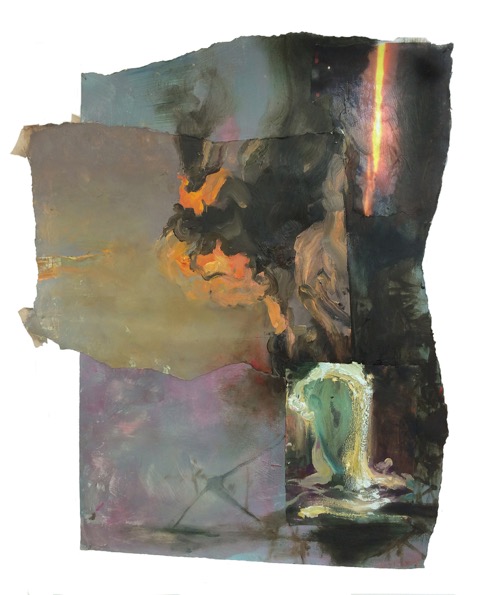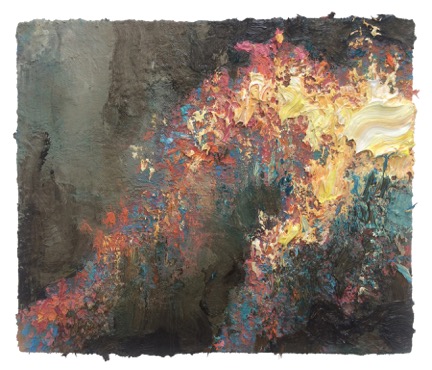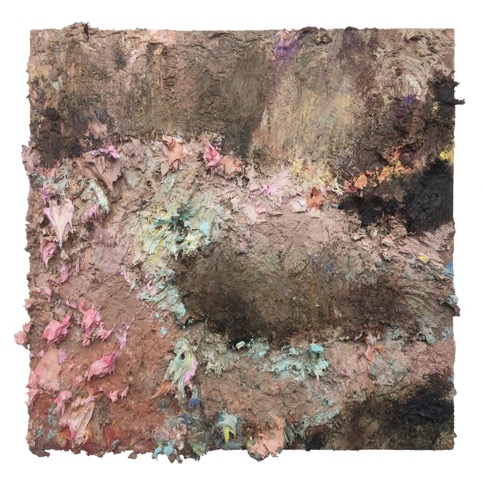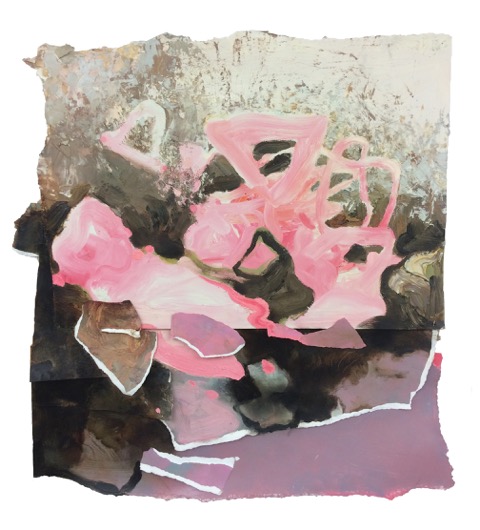'Sky Is Ground' and 'Vapour Wave'
The first time that I saw Alexandra's work she had not long relocated to Stroud from Canada. At that time, whilst her paintings tended towards abstraction, they never quite transcended their starting points in imagery, sometimes of underwater scenes and, most strikingly, of military aircraft dropping decoy flares in patterns known as ‘angels of death’, intended to deflect enemy fire. Colour and surface were achieved by painstakingly layering tinted varnishes. The results were highly worked, dream-like images with slick lustrous surfaces, suffused with a queasy crepuscular light. Out of this dim half-light there were faint glows and sudden flashes of phosphorescence. They carried a sense of mysterious depth and of something coming into being, something dark, faintly repellent, but nevertheless compelling.
This work was continuous with the paintings that Alexandra had received wide recognition for in Canada. The working methods that had evolved through her early career sustained her through a period of transition into a new life in a new country. But she came to a point when, having built a new studio, she wanted to break away from the established routines of her practice, to let go of self-imposed rules and to reflect the bigger changes that had happened in her life. Her approach to this transformation has been characteristically rigorous and systematic. Where she once worked within a tight, constraining, framework she has forced herself to paint spontaneously. Where the earlier work had a kind of meticulous, painterly precision, these new paintings have a loose, vivid unpredictability. The surfaces are no longer glossy, but are energetically course, with vigorous brush marks and crusty layers of thick paint. Her palate still includes murky, dark tones, but these are now overlaid with sickly ice-cream pastel colours that fizz with chemical toxicity. She paints quickly onto paper and board, taped to the walls of the studio, casting work aside as she goes along and then returning to it later, ripping out sections and collaging them together to create sudden disruptions and juxtapositions. Torn edges and fragments of tape are left to be incorporated into the new assemblages. This work has a raw, dynamic force, but it is never unintentional. It draws on all of Alexandra’s experience and understanding as an artist.
'Moon Force' and 'Tonsil Heaven'
Looking at Alexandra’s earlier work, I was reminded of Turner’s paintings of Norham Castle at sunrise. They had something of the same sense of imminence, of a world swimming into focus in the gathering light. The reference persists in this new work, but where it once evoked primordial, organic processes it has now taken on more dramatic, cosmic, dimensions, suggesting vast geological events, new worlds emerging out of dark chaos.
Since coming to the UK Alexandra has had a number of group and solo shows, but this will be her first opportunity to show a coherent collection of new work in Stroud. She is particularly pleased to be showing at Line Gallery, which is an artist-led space curated by Jessie James and Rosalie Darien Jones. Their aim is to create a nurturing space for artists to try out new work and to develop their ideas. It was in just this kind of space that Alexandra was able to build her practice as a young artist herself back in Eastern Canada.
It Fell From Earth will be exhibitied at the Line Gallery from Monday 30th May and runs until Sunday 12th June. Further information can be found at www.alexandradarbyshire.com and www.linegallery.co.uk
Paul Harper has a wide range of experience of working in the arts. He was a founding director of Alias Arts and is Vice-chair of the Forest of Dean Sculpture Trust. He currently combines writing, research and teaching with consultancy in the visual arts and crafts.




